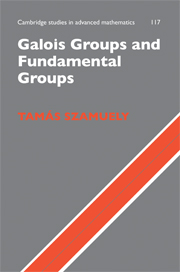Preface
Published online by Cambridge University Press: 05 August 2012
Summary
Ever since the concepts of the Galois group and the fundamental group emerged in the course of the nineteenth century, mathematicians have been aware of the strong analogies between the two notions. In its early formulation Galois theory studied the effect of substitutions on roots of a polynomial equation; in the language of group theory this is a permutation action. On the other hand, the fundamental group made a first, if somewhat disguised, appearance in the study of solutions of differential equations in a complex domain. Given a local solution of the equation in the neighbourhood of a base point, one obtains another solution by analytic continuation along a closed loop: this is the monodromy action.
Leaving the naïve idea of substituting solutions, the next important observation is that the actions in question come from automorphisms of objects that do not depend on the equations any more but only on the base. In the context of Galois theory the automorphisms are those of a separable closure of the base field from which the coefficients of the equation are taken. For differential equations the analogous role is played by a universal cover of the base domain. The local solutions, which may be regarded as multi-valued functions in the neighbourhood of a base point, pull back to single-valued functions on the universal cover, and the monodromy action is the effect of composing with its topological automorphisms.
Information
- Type
- Chapter
- Information
- Galois Groups and Fundamental Groups , pp. vii - xPublisher: Cambridge University PressPrint publication year: 2009
